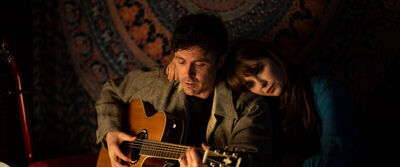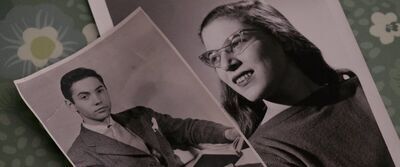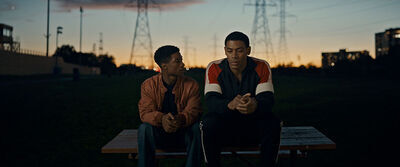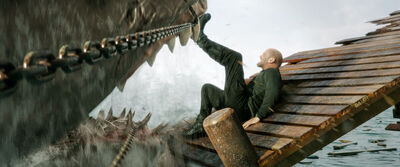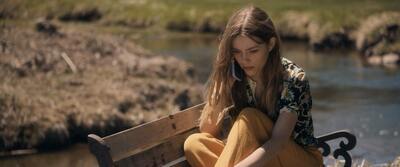Klondike
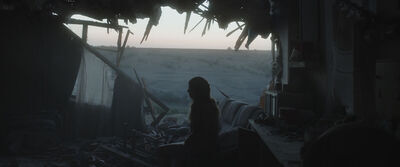
Pregnancy makes you pragmatic. Yes, your body is bulging and your hormones are raging and anxiety is plaguing you over the great unknown of it all, especially if you’re expecting your first child like Oksana Cherkashyna’s Irka is in the Ukrainian drama “Klondike.”
But someone’s still got to milk the cow and dust the cabinets and do all the canning for winter—and that someone is you. The fact that Irka must maintain all these mundane tasks in the midst of increasing instability—she lives in Eastern Ukraine on the Russian border at the start of the Donbas war in 2014—provides both the absurd conflict and dark humor in writer/director/editor Maryna Er Gorbach’s film. Irka is performing all these chores, for example, in an already modest house where the living room wall now has been blown wide open, the accidental target of an errant mortar blast. This adds a degree of difficulty in keeping a tidy home.
Cherkashyna gives a stoic and steely performance, and Er Gorbach lingers over her quietly determined features in the kinds of long, single takes she favors throughout her understated film. “Klondike” is a patient and observant movie, giving us time to notice the small details in the rundown but functional house Irka shares with her husband, Tolik (Serhii Shadrin), or the way afternoon clouds play across the barren, rural landscape as Irka stomps away in frustration, seeking a moment of peace. Working with cinematographer Sviatoslav Bulakovskyi, Er Gorbach skillfully uses steady pans and slow zooms – both in and out – to reveal devastating details as the film reaches its dramatic conclusion.
The situation is already stressful at Irka and Tolik’s meager farm when Malaysian Airlines Flight 17 plummeted from the sky en route from Amsterdam to Kuala Lumpur on July 17, 2014, killing the nearly 300 people on board. (“Klondike” is inspired by true events.) The crash was the work of Russian-backed Ukrainian separatists, one of which Tolik is on the verge of becoming himself. This heightens the tension in his marriage with Irka, which ranges from perturbed teasing to tearful screaming. “They bombed the stroller. Where will I put my child?” Irka wonders aloud in a way that straddles the line between wry humor and dire need.
But because she is about to give birth so soon, everyone is trying to get her out of the house and into a hospital. This includes the mostly useless Tolik and her concerned brother, Yaryk (Oleh Shcherbyna), whose suspicions about Tolik’s alliances are growing. Irka insists on staying put, despite the danger surrounding her. Er Gorbach’s film becomes more harrowing but maintains a matter-of-fact tone, which makes the fear feel even starker. The subtle, deep strings of Zviad Mgebry’s score enhance the haunting atmosphere. The crunch of truck tires carrying tanks into town and the shrill crow of a rooster in the distance pierce the quiet. Anything could happen at any moment, but you get the sense that Irka is prepared to withstand it.
This is especially evident in the film’s lengthy final shot, which provides a fascinating juxtaposition between total disregard for human life and the possibility of hope for the future. When Cherkashyna lets the emotions flow, she reveals such a deep reservoir of pain that it’s startling. Er Gorbach’s film may feel too slow and restrained at times, but moments like this in which she lets her powerful imagery play out in unadorned fashion show why this was such a wise choice. And while this particular story takes place nearly a decade ago, it remains unfortunately timely as Russia’s horrific war in Ukraine rages on; “Klondike” helps put a specific, vivid face on a faraway conflict.
Now playing in theaters.



